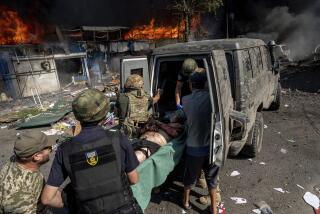U.S. Envoy Presses Serbs to Break Kosovo’s Rising ‘Cycle of Violence’
- Share via
BELGRADE, Yugoslavia — Amid reports that Serbian police were rushing to bury Albanian dead in Kosovo, the Clinton administration’s Balkan trouble-shooter pressed Tuesday for urgent dialogue to break “a dramatically worrisome cycle of violence and more violence” in the restive Serbian province.
U.S. envoy Robert Gelbard called on Serbs and ethnic Albanians to immediately stop the violence in Kosovo but insisted that the first move must be made by the government of Yugoslav President Slobodan Milosevic, which triggered last week’s fighting with its crackdown on Albanian separatists.
“This government has trampled on the rule of law and ignored its obligation to protect the rights of all citizens,” Gelbard told reporters in Kosovo’s capital, Pristina, after meeting with Ibrahim Rugova, the leader of the principal ethnic Albanian party in the province. “The only response [the Yugoslav government] seems to know [in Kosovo] is violence and repression.”
The fighting raised the specter of another Bosnia-Herzegovina--another war that would spread through the fragile and ethnically fragmented Balkans like wildfire, drawing in countries as far away, and as strategically important to the West, as Greece and Turkey.
Milosevic, roundly condemned worldwide for unleashing the wave of repression, showed little sign of heeding calls for moderation.
State television, controlled by Milosevic, blasted a decision by Washington and five European allies to impose a new round of sanctions on his government, saying the move “will throw gasoline on a fire [the West] started.”
Separately, however, the government in Serbia--which with Montenegro makes up the rump Yugoslavia--issued its first invitation for talks with the ethnic Albanian political leadership in Kosovo.
Albanians were leery of the offer but said they are willing to enter into an unconditional dialogue if that is what’s on the table.
The Serbs had previously insisted that the ethnic Albanians, who make up 90% of the Kosovo population, give up their demand for independence before a dialogue could be opened.
However, the rage sparked by last week’s assault on Kosovo villages will now make political negotiations difficult to carry out.
The government maintains that the operation by special police forces, which left at least 77 people dead, was aimed at wiping out “terrorists.”
In a statement released Tuesday afternoon, the government said it was distinguishing between “terrorists” and “responsible” ethnic Albanians.
On Tuesday, grieving families filed past about 50 bodies, including women and children, laid under white sheets in a shed in the town of Srbica, the center of the violence. Most refused to bury their relatives until international forensic experts could examine the bodies to confirm the Albanians’ contention that many of the victims were executed.
However, late Tuesday, reporters from the independent Albanian-language newspaper Koha Ditore said Serbian police, who had threatened to dispose of unclaimed bodies, buried 46 of the victims--and with them, effectively, any evidence of alleged atrocities.
The regime in Belgrade regards the province of Kosovo as the cradle of Serbian history and culture and insists that it remain part of Serbia.
Many ethnic Albanians want independence. They have set up a form of parallel government since Milosevic stripped Kosovo of its autonomy in 1989.
Milosevic has repeatedly shown himself impervious to international condemnation. He has also shown an ability to outmaneuver critics and opponents and retain power--even when he risks further impoverishing and isolating his country.
Gelbard met with Milosevic on Monday in Belgrade, the Yugoslav and Serbian capital, where he was treated to a lecture from the Yugoslav president on his view of events.
Gelbard tried to convince Milosevic that the Kosovo bloodshed has seriously alarmed the six-nation Contact Group that was established to monitor peace in the Balkans.
On Monday, the group agreed to a ban on sales of arms to Yugoslavia and warned of more sanctions if the special police forces do not withdraw from Kosovo within 10 days.
Belgrade analysts say Milosevic probably believed that his crackdown on Kosovo would not draw heavy criticism. He is also counting on avoiding any real punishment because of what he sees as divisions among international officials, analysts say.
Indeed, Moscow has refused to go along with most of the sanctions Washington wants. China has labeled the Kosovo violence an internal matter for Serbia.
Warning that slapping sanctions on Belgrade would be “counterproductive,” Russian Foreign Minister Yevgeny M. Primakov called Tuesday for an immediate start to negotiations to end the Kosovo crisis. He also stressed that Albanian separatists--not just Serbs--should be held accountable for the violence.
Primakov told reporters in Moscow that it is necessary to halt terrorist actions in Kosovo and expressed concern over arms deliveries to the separatists.
Serbia has long been allied to Russia, but Primakov insisted that Russia was not at odds with the position of the United States, Britain, France, Germany and Italy, which are considering further sanctions against Serbia to bring an end to the violence.
Times staff writers Richard C. Paddock in Moscow and Craig Turner at the United Nations contributed to this report.
More to Read
Sign up for Essential California
The most important California stories and recommendations in your inbox every morning.
You may occasionally receive promotional content from the Los Angeles Times.














